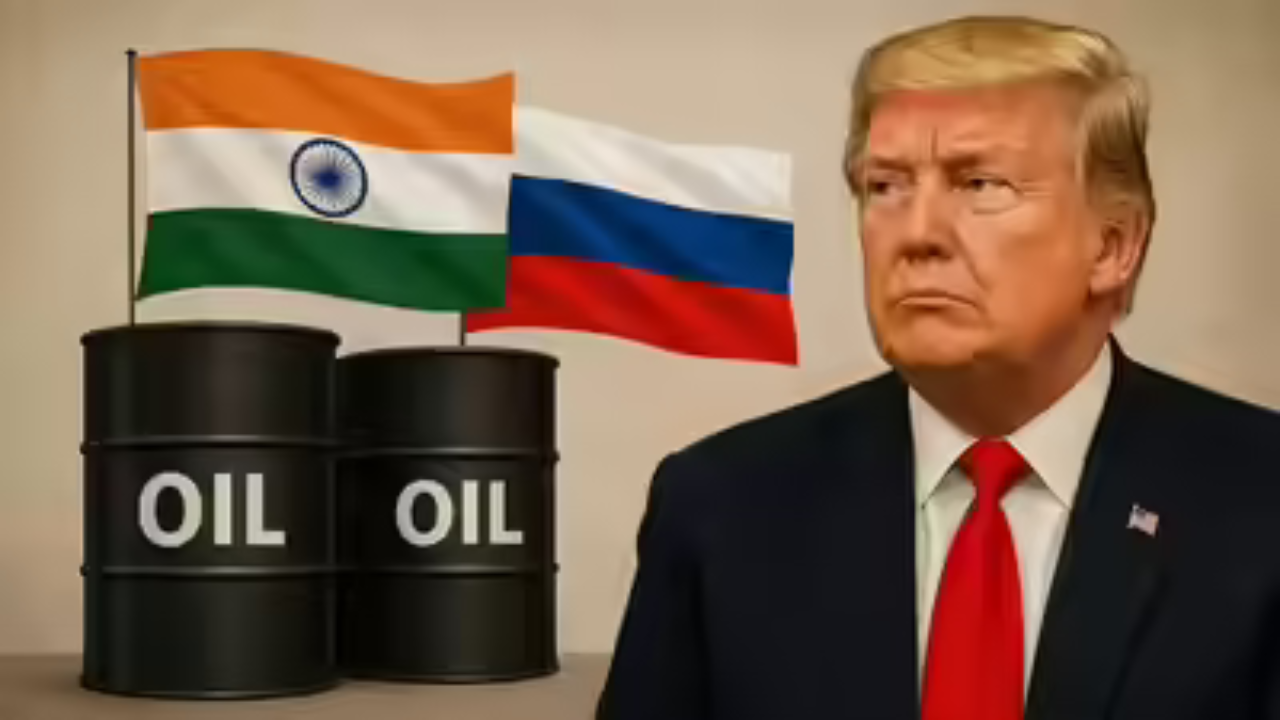
Post by : Shivani
In a decisive move, US President Donald Trump’s administration sanctioned two of Russia’s largest oil exporters, Rosneft and Lukoil, a step that may compel India and China — two of the top importers of Russian crude — to sharply reduce or even stop buying oil from Moscow. The sanctions extend coverage to 34 subsidiaries, impacting supply chains and global market dynamics in ways not seen since the start of the Russia-Ukraine war in 2022
Unlike previous tariff-based pressure, the sanctions include direct prohibitions on financial transactions with the targeted Russian firms. India already contends with 50% tariffs on key imports, a significant portion attributed to Russian crude. However, while tariffs merely increase costs, sanctions effectively block trade by freezing assets and threatening severe penalties for violators, including secondary sanctions on non-US actors
The US Treasury Department’s guidelines outline that any property or interests in property held by the designated Russian firms on American soil, or under US control, will be blocked. Violations could incur heavy civil and criminal penalties, extending risks to foreign financial institutions engaged with the sanctioned entities
Statistical data from September 2025 reveals Chinese imports of Russian oil stood at about 2 million barrels daily, with India close behind at 1.6 million barrels. Together, these countries accounted for nearly 85% of Russia’s oil exports. The US set November 21 as the deadline for concluding financial transactions and deliveries, giving buyers a narrow window to wind down trade.
The immediate effect has been a surge in global oil prices, as markets brace for the removal of up to 3–4% of global daily supply. Brent crude jumped above $66, continuing its upward climb amid fears of tighter supply and competition for alternatives.
Indian oil refiners, both public and private, face the dilemma of reorganizing supply chains. Reliance Industries, which has a major contract with Rosneft, announced imminent operational adjustments to comply with sanctions, while Nayara Energy, with significant Russian ownership, faces major challenges marketing products from its Gujarat-based Vadinar facility
For Indian Oil Corporation and other state-run refiners, Russian oil constitutes 15–18% of crude procurement; yet alternative sourcing from Middle East, Africa, or US is now paramount. With sanctions replacing the previous $60-per-barrel price cap, compliance for all buyers has become complex, involving new transport, payment methods, and logistical workarounds
In China, state-owned giants like PetroChina, Sinopec, CNOOC, and Zhenhua Oil have reportedly suspended seaborne Russian crude purchases, while independent refiners ("teapots") — accounting for most maritime imports — face shifting compliance risks and strategic uncertainty
Despite the strict US measures, analysts believe Russian oil may still reach markets through a covert network of shadow tankers, intermediaries, and smaller financial institutions. Previous European restrictions saw the Russian authorities establishing transhipment facilities and complex trading routes, diluting the direct impact of sanctions.
Industry observers note that enforcement remains the critical challenge. The lasting impact will depend on the US’s appetite — and ability — to track and restrict creative workarounds, which have allowed Russian crude to “find its way” into global supply chains in the past
Russia supplied 34% of India’s crude oil requirements in 2025, with Rosneft and Lukoil delivering about 60% of that total. According to analysts at ICRA, sourcing alternative supplies at current market rates would increase India’s oil import expenses by approximately 2%, pressuring industry margins, especially as competitors also pivot toward Middle East and African sources
GTRI notes India faces a pivotal dilemma: Would the 25% US tariff be lifted if India stopped buying from Rosneft and Lukoil, or must it fully withdraw from all Russian oil — a nearly impossible move for a nation importing 85% of its crude? Clarity on this point remains pending as diplomatic negotiations continue
Refiners remain cautiously optimistic that Russian oil will not completely vanish from world markets, despite the immediate disruption. As past sanctions have shown, Russian authorities may still broker alternative sales, especially through intermediaries and off-market logistics. Enforcement and the response of global regulators will determine how long such routes remain viable, and whether prices stabilize as non-Russian supplies grow to fill the gap
The coming weeks will be decisive, with industry watchers monitoring how quickly India and China realign their energy portfolios and whether the US sustains stringent enforcement on secondary actors. Ultimately, the scale and duration of disruption will be shaped by market adaptation, diplomatic flexibility, and the resolve of all actors in the new global oil landscape
The latest US sanctions on Russian oil exporters mark a turning point for global markets and India-China energy security. As enforcement intensifies, all eyes remain on how market dynamics, logistical innovations, and diplomatic negotiations shape the future of crude imports, prices, and the broader international energy order
US sanctions Russian oil exports Rosneft Lukoil Energy industry India oil imports China oil imports










Advances in Aerospace Technology and Commercial Aviation Recovery
Insights into breakthrough aerospace technologies and commercial aviation’s recovery amid 2025 chall

Defense Modernization and Strategic Spending Trends
Explore key trends in global defense modernization and strategic military spending shaping 2025 secu

Tens of Thousands Protest in Serbia on Anniversary of Deadly Roof Collapse
Tens of thousands in Novi Sad mark a year since a deadly station roof collapse that killed 16, prote

Canada PM Carney Apologizes to Trump Over Controversial Reagan Anti-Tariff Ad
Canadian PM Mark Carney apologized to President Trump over an Ontario anti-tariff ad quoting Reagan,

The ad that stirred a hornets nest, and made Canadian PM Carney say sorry to Trump
Canadian PM Mark Carney apologizes to US President Trump after a tariff-related ad causes diplomatic

Bengaluru-Mumbai Superfast Train Approved After 30-Year Wait
Railways approves new superfast train connecting Bengaluru and Mumbai, ending a 30-year demand, easi